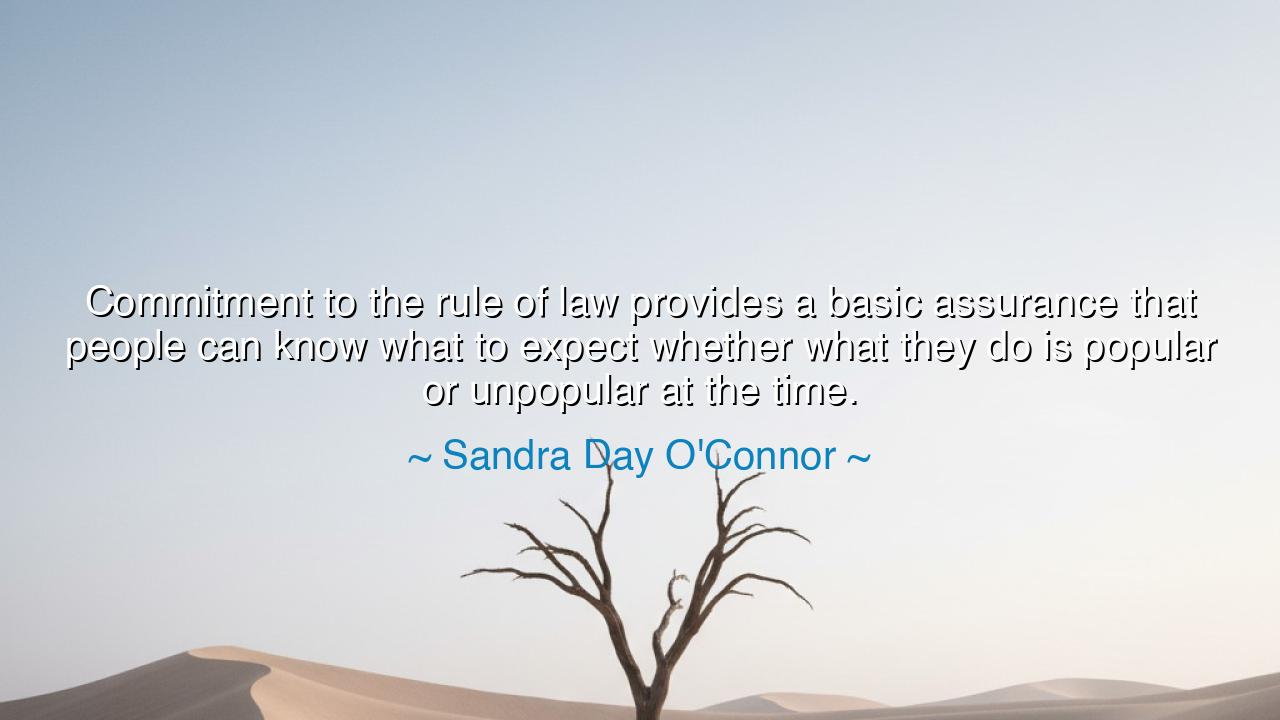
Commitment to the rule of law provides a basic assurance that
Commitment to the rule of law provides a basic assurance that people can know what to expect whether what they do is popular or unpopular at the time.






The noble Sandra Day O’Connor, the first woman to serve upon the highest court of her nation, spoke these words of solemn truth: “Commitment to the rule of law provides a basic assurance that people can know what to expect whether what they do is popular or unpopular at the time.” In this utterance, she revealed a cornerstone of civilization, a principle without which order collapses and justice withers. For in a world of passions and fleeting whims, it is the rule of law that stands unmoved, the guardian of both freedom and fairness.
What, then, is this rule of law? It is the covenant that no man, however mighty, is above it, and no man, however small, is beneath its protection. It is the shield of the weak and the boundary of the strong. It is the promise that decisions will not rest upon the stormy moods of the crowd nor the desires of tyrants, but upon principles known, recorded, and honored. Without it, life becomes a gamble with fate; with it, life becomes a path, steady and visible, upon which even the humblest may walk with dignity.
Consider the story of Socrates of Athens. When accused of corrupting the youth and defying the gods, he stood before the court of the city. He could have fled, for many urged him to escape. But he refused, for though the verdict was unjust, he declared that to defy the laws of Athens would be to wound the very order that sustained the city. Thus, even as he drank the cup of hemlock, he bore witness to the power of law over chaos. Though his act seemed madness to some, history remembers him as one who chose principle over survival, teaching that true freedom lies in reverence for law, even when the winds of popularity blow against us.
O’Connor’s words remind us that popularity is fleeting, but justice must be eternal. The mob may cheer one day and condemn the next. Leaders may rise with honeyed tongues, promising favor to their friends and vengeance to their enemies. But if law bends with every passion, it ceases to be law—it becomes tyranny in disguise. The true majesty of law is that it treats the beloved and the despised with equal measure, providing certainty where otherwise only fear would reign.
Yet this truth is not only for kings, judges, and statesmen. It is for all who live among others. Every household, every community, every workplace thrives only when rules are known, clear, and justly applied. Where rules shift like shadows, trust dies; where rules are steadfast, trust flourishes. The rule of law is thus not only a shield of nations but also a sacred principle of human fellowship.
The lesson is clear: honor the laws that protect fairness, and resist the temptations of favoritism, rage, or fear. Stand for principle, even when it brings you no applause. For applause fades, but justice endures. And when you see laws bent to serve power rather than truth, do not be silent. For silence in such moments is the seed of tyranny.
Practical action lies before us: learn the laws that govern you, not only the statutes of your land but also the rules of your conscience. Defend them when they are just; seek to change them only through rightful means when they are not. In your daily life, be steadfast in fairness: judge not by popularity, but by principle. Keep promises, apply standards evenly, and never allow your judgment to be bought by favor or fear.
Thus, O children of the future, carry O’Connor’s wisdom like a torch through the darkness: commitment to the rule of law is the anchor of freedom. For when law is honored above the passions of the moment, people can walk with assurance, knowing that whether their deeds please or anger the crowd, justice remains unshaken. And this is the true foundation of peace, of dignity, and of hope for generations yet to come.






AAdministratorAdministrator
Welcome, honored guests. Please leave a comment, we will respond soon